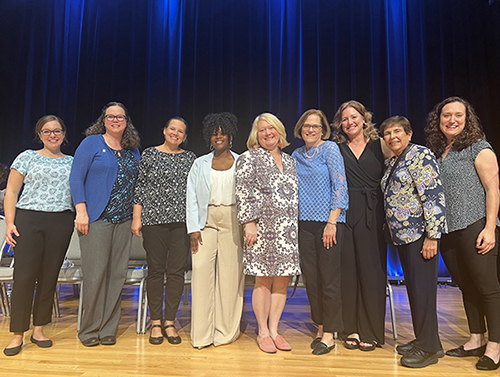
Meet Latesha K. Harris, BSN, RN, an alum of Duke University's Department of Population Health Sciences (DPHS) 2022 BRIDGE Program cohort. As a first-generation college graduate and the first nurse in her family to pursue a doctoral degree, Latesha's journey is a testament to her dedication, resilience, and passion for healthcare. Her story is one of breaking barriers and striving for excellence in nursing and health services research.
Latesha's academic journey began at the University of North Carolina at Chapel Hill (UNC-Chapel Hill), where she graduated with university distinction and highest honors in December 2020. She continued her education at UNC-Chapel Hill and is now a Hillman Scholar in Nursing Innovation, a prestigious BSN-PhD program designed to produce innovative nurse scientists. Latesha is also a Robert Wood Johnson Foundation Health Policy Research Scholar, a national leadership development program focused on health policy.
Along the way, her professional experiences in various clinical settings have provided Latesha with a broad perspective on the challenges and opportunities in healthcare. Driven by a commitment to continuous learning and leadership, she applied to the DPHS BRIDGE Program.
"The program's focus on bridging gaps between academic knowledge and practical application, along with its strong support network, made it an ideal fit for my career goals," said Latesha. "BRIDGE presented an amazing opportunity to 'blend the blues,' an opportunity for interprofessional health professionals to collaborate across schools."

During her time in the program, Latesha focused on the critical issue of police violence and its impact on population health. Under the mentorship of DPHS' Matthew Dupre, PhD, she explored the multifaceted effects of police violence on communities, aiming to uncover patterns, identify at-risk populations, and develop strategies to mitigate adverse health outcomes. Her research broadened her understanding of the intersection between racism-related stressors and public health and strengthened her commitment to advocating for evidence-based policy changes.
"One of the most impactful aspects of the BRIDGE program for me was the opportunity to articulate my emerging research program to others," she said. "Describing my work to a diverse audience not only helped clarify my thoughts but also invited invaluable feedback that has been instrumental in shaping my research direction."
Latesha found that engaging with other Scholars and experts from various disciplines deepened her understanding of how to integrate different methodological and theoretical approaches to enrich her comprehension of complex phenomena. She feels the program's network of mentors and resources and its emphasis on leadership, research, and community engagement have empowered her to excel in her career and contribute meaningfully to her field.
Since participating in the BRIDGE program, Latesha has remained committed to broadening her research opportunities and disseminating her findings at various prestigious conferences, including the Academy Health Annual Research Meeting and the American Heart Association Scientific Sessions. She has also co-authored several impactful papers, including studies on daily spiritual experiences and allostatic load trajectories in midlife African American women and psychological distress among black working adults during the COVID-19 pandemic.
Latesha aspires to become a nurse scientist with a research program exploring the intersection of structural racism, psychosocial stressors, and racial/ethnic inequities in women's cardiometabolic health. She hopes her work will provide empirical evidence and lead to evidence-based practice changes and policy reforms that address health disparities and improve the quality of life for minority populations.
In keeping with this goal, Latesha is currently the principal investigator for the pilot award Racism-Related Stress and Cardiometabolic Risk in African American Women (2024-2025). She invites interested individuals to determine if they are eligible to join her study by completing this Structural Racism and Cardiometabolic Risk Screener. Latesha is also a predoctoral T32 trainee at the National Institutes of Health (NIH)/National Institutes of Nursing Research (NINR) (2023-2024).
Outside of her professional pursuits, Latesha is a proud mother of two and enjoys traveling, cooking, reading, writing, and dreaming. Her children are her biggest motivation and inspiration, and she cherishes the opportunity to learn from their interests and ideas.
Learn more about Latesha, her research, and expertise by visiting her website: https://lateshakharris.org/.